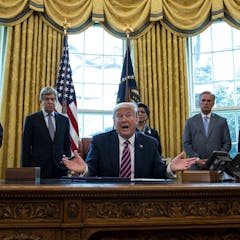
Articles sur Pandemic
Affichage de 1361 à 1380 de 1583 articles

Despite all the effort that goes into predicting disasters, governments have been bad at acting on what they were told.

Human beings have difficulty assessing distant threats.

When the things we consider to be normal break down, outcomes that once seemed unlikely or extraordinary become possible.

For athletes, COVID-19 means more than cancelled competitions. Having their athletic goals put on hold and their training routines disrupted can take a toll on athletes’ mental health.

From cholera outbreaks to public health actions, war metaphors have long been used to describe diseases, to show what we fear and to explain our world to ourselves.

Aerosols are the tiny particles of liquid and material that float around in our environment. When they come from an infected person, they may be a significant source of coronavirus transmission.

Sure, there were no Zoom calls or ventilators. But thanks to a prolific diarist, we can see some striking similarities, from daily death counts to quack remedies.

What is political will or political commitment to disaster risk reduction? Why is it important to measure political commitment? And how to measure it?

The government plans to monitor sewage for the SARS-CoV-2 coronavirus. And while this holds promise to tracking future local outbreaks, there are also some sticky ethical questions to consider.

Swedish authorities claim the country is rapidly approaching herd immunity.

When resources are drained, people are tired and communities are recovering from trauma, social connection is vital.

The world rightly expressed shock and dismay at Donald Trump’s suspension of US funding for WHO. To respond, other governments, funders and citizens are urgently needed to fill the gap.

Hospitals have requested that people avoid non-emergency visits, and conspiracy theorists are posting images of empty parking lots online as false proof that COVID-19 is an elaborate hoax.

Robots are helping health care workers and public safety officials more safely and quickly treat coronavirus patients and contain the pandemic. They have something in common: They’re tried and tested.

Being a member of a certain age group shouldn’t be a liability.

Politicians and public health officials appeal to our sense of fairness in requesting the public’s co-operation in controlling the pandemic. But COVID-19 doesn’t affect everyone equally.

Prison lawyers in Canada are scrambling to fill the gap left by federal inaction on inmate populations who are vulnerable to COVID-19. A recent case in Ontario could provide a legal precedent.

There are telling parallels between the current pandemic and those that decimated indigenous populations in the post-Columbian era in the Amazon.

Canadians are living under a states of emergency, coping with a limping economy and social distancing as well as the stress of the pandemic itself. Many might be asking: when will it end?

Whatever the eventual impact on women’s candidacies post-pandemic, COVID-19 has the potential to shock the system, upending or reinforcing existing gender imbalances in political power.
